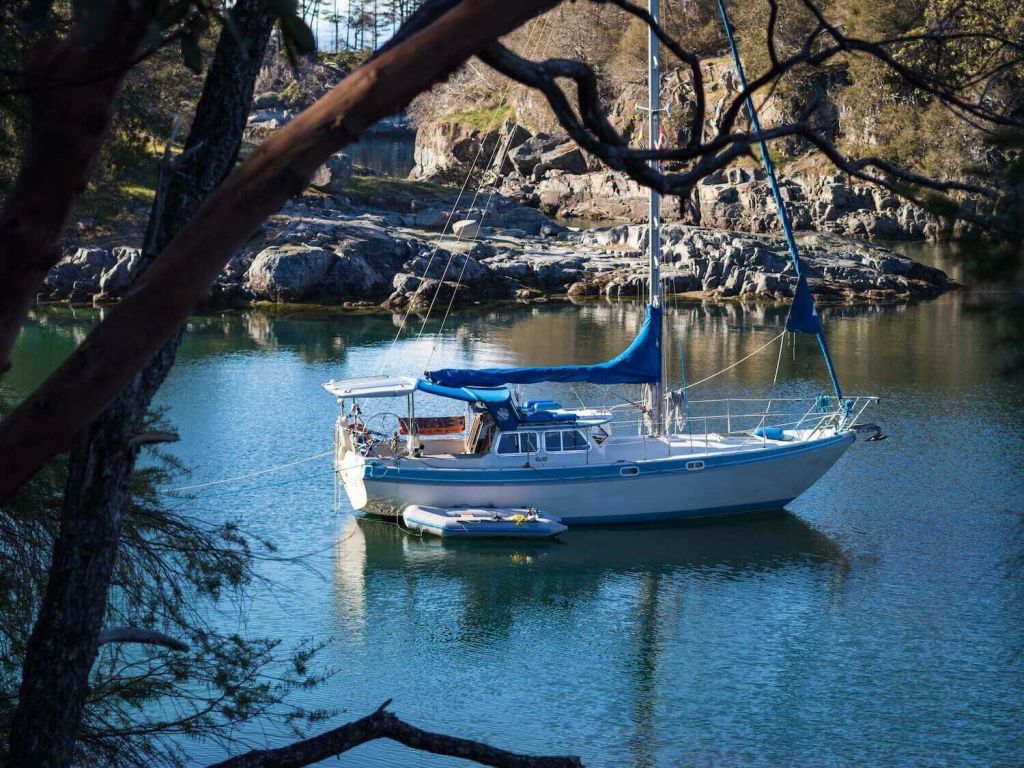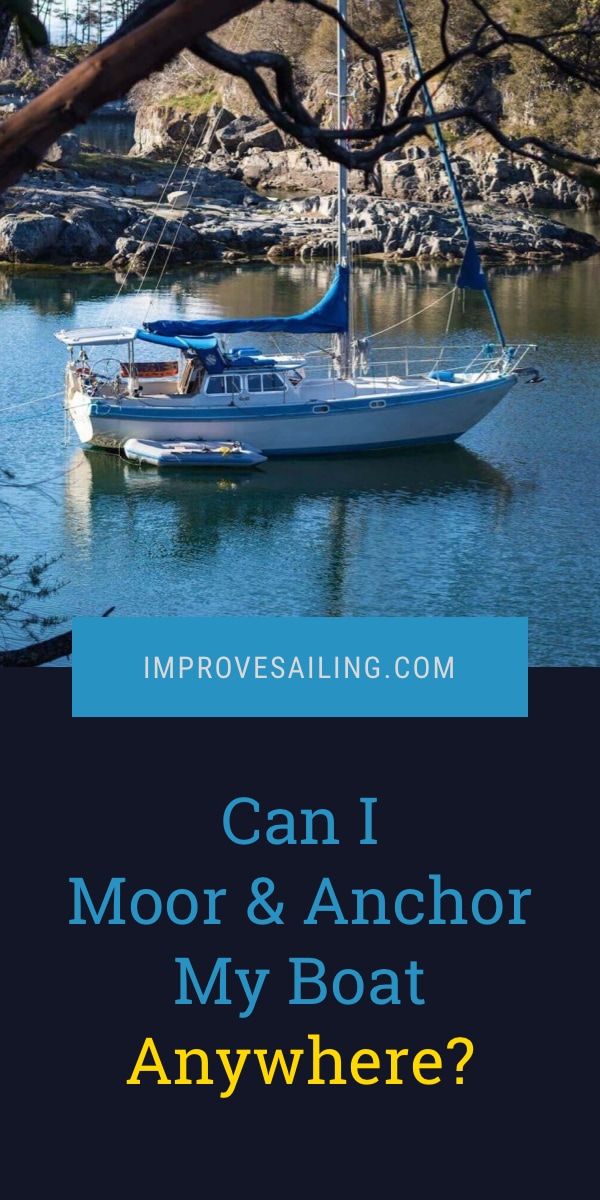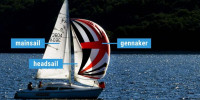Can I Moor & Anchor My Boat Anywhere?
When you leave your boat somewhere, you want to know it will be there and be safe when you come back for it. But marinas are expensive and not always where you want the boat to be. There are options though, if you take some care.
Can I moor & anchor my boat anywhere? The short answer is no, you can not anchor or moor anywhere. Most cities and towns have restrictions on permanent mooring locations, and some restrict anchoring. And not every spot is safe or ideal to leave your boat unattended for long.
That doesn't mean you can't leave your boat in a great many places, it just means you need to be careful about where and how you do it. In this article, I'll give you the tips you need to leave your boat in the right place.

On this page:
Short Term Anchoring Versus Mooring
Mooring your boat refers to where you leave it when you aren't using it and involves tying your boat to something fixed in the water. It can be a chain attached to large weight on the bottom or a screw into the seabed, or it can be a set of pilings or other structures.
Anchoring your boat is using your own ground tackle (anchor and rode) to secure your vessel. Anchoring is short term, as you will not be leaving the boat unattended for long periods it is safer to use a less permanent means of securing the boat.
Moorings can be either commercial or private.
- Commercial moorings are convenient to rent from the marinas and towns that manage them, though full-time seasonal rentals may be more difficult to come by than transient rentals for a short visit.
- Private moorings are owned or leased to an individual.
Do not pick up a mooring if you do not know who owns it. You never know when the owner will return, or how large of a boat the mooring is rated to hold.
Anchoring is usually free, but some locations require a permit or paying a fee.
Restrictions on Mooring & Anchoring
Obtaining or Placing a Mooring
Almost all coastal towns have strict regulations about the placement of permanent mooring structures. Harbors and coves are tightly monitored, and mooring fields are planned. To secure a private mooring of your own will require a permit, and it will require you to purchase or lease hardware that passes stringent safety rules and inspections.
If you own waterfront property, it may be easier to put a mooring in front of your house, but you can not place a mooring in most areas without notifying someone. There are some places where you can throw down a hunk of cement or an old engine block and tie a line to it, but they are the exception now, not the rule.
Anchoring is less regulated since it is not permanent. But it is not without regulation, either.
Anchoring Too Close to Moorings
Harbors with permanent moorings have restrictions on anchoring too close to established fields. Submerged cables are a common reason for anchoring prohibitions, but those are often marked with indicators on land and always on charts.
Geographic Restrictions
Some regions have large geographic restrictions, for example, much of the Mediterranean restrict anchoring too close to shore to for environmental reasons.
No Anchoring Zones
Certain places designate no anchoring zones for water sports or to keep traffic clear for commercial vessels. In the Australia's Gold Coast anchoring zones have strict time limits that require anchored boats to move periodically to prevent boat abandonment and to give a fair share of the best anchorages to all boaters.
Anchoring Prohibited Completely
There is also a disturbing trend over the last few years for local governments to restrict or ban anchoring outright in certain areas base on pressures from property owners to clear the water of abandoned boats and liveaboards.
Florida has had several legal battles over anchoring rights, and other states in the U.S. have imposed similar local restrictions. These locations may not be clearly marked with signs or on charts, but using them may result in a visit to your boat from local law enforcement offering polite encouragement to move your boat, or worse, giving you a citation.
A Good Place to Leave Your Boat
An ideal place to leave your boat - whether permanently or just to go in to dinner - is a protected location without too much exposure to open water and winds. Finding the best anchorage is outside the scope of this post, but there are a few guidelines you can use.
- Pick a spot with protection from wind and waves, especially in the prevailing direction for expected weather.
- Make sure there is some place to disembark or a way to get to and from the boat that is safe and practical. There should be a dinghy dock or beach within reach where you can leave your tender while ashore.
- The bottom should be suitable for holding an anchor. Avoid grass beds, rocks, and other seabed that does not hold an anchor well.
- Don't encroach on any channels, mooring fields, or other anchored boats. Pay attention to boat traffic.
- Check the weather before you leave the boat, to make sure the spot you pick is still protected if the wind changes or bad weather comes through.
- If you are anchoring and may not return before dark, don't forget your anchor lights.
The Unattended Boat at Anchor
Some people choose to store their boats at anchor instead of a permanent mooring or slip, whether for reasons of economics or convenience. While this may work in the short term, there are significant risks for the boat and the boat owner especially if the boat is not visited regularly. A boat on a mooring can sit safely for weeks without harm, but an anchored boat should be checked almost daily. Some risks include:
- Bad weather can unseat anchors and cause them to drag.
- Birds may move onto unoccupied boats and make a mess. If a boat is to be left, steps should be taken to leave bird scaring devices on board.
- In most jurisdictions a boat owner is responsible for any damage done by his or her vessel. An unattended vessel which drags anchor or sinks can cause extensive damage to other boats, structures on land, or the environment.
- Unattended boats at anchor are more likely to attract unwanted attention from law enforcement and complaints from local property owners.
- Insurance companies are unlikely to cover losses boats left unattended at anchor, many policies specifically exclude this or require a permanent mooring.
- Unattended boats can be targets for theft and vandalism.
A Good Mooring
Marina and public rental moorings can be an affordable solution for boat storage in areas where private mooring permits are unavailable and a slip is too expensive. A good marina will inspect its moorings annually and watch boats in the field for problems. Many marinas will have a launch service to get you and your guests to and from your boat, as well as restrooms, picnic areas, grills, restaurants, and other facilities onshore customers can use.
Waterfront towns often have seasonally available rental moorings. Town moorings rarely have the same facilities or security as marinas, but they will have a beach or dinghy rack to stow your tender. The moorings should be regularly inspected and safe. Annual rentals of town moorings are usually reasonably priced and are in very high demand and may have a waiting list measured in years, making a commercial mooring available right now an appealing option while you wait.
So Where Can I Anchor?
In spite of all the regulations and rules, there are still many places to anchor. Vastly more anchoring spots are available than restricted - it's the prime, high demand spots that have the most restrictions. Nantucket Harbor or Martha's Vineyard - high profile, high traffic boating destinations - have much tighter regulation than a backwater cove on the Chesapeake. You should still take time to check out your destination and its rules before you get there, since local ordinances may not clear from the water.
Most charts show designated anchorages and prohibited for highly regulated harbors or coves - look for a little anchor symbol, usually circled or an anchor with a slash through it. Unless specifically designated as a "No Anchoring" zone, in almost any protected spot in coastal waters it is legal to drop the hook.
Related Questions
Can you dock a boat anywhere? Most docks are privately owned, whether by an individual or a commercial marina. You should never secure to a dock without permission unless in an emergency. Public docks generally have time limits, but on many you can pay to stay overnight.
How long can you anchor? If you are staying with the boat, you can anchor as long as any local regulations allow. If there are no regulations limiting it, you can stay as long as it is safe.
Is it legal to live on a boat at anchor? It is legal almost everywhere. However, you comply with all local laws regarding anchoring locations and sanitation.
Did you find the answer to your specific question?
👍 86 👎 20


Comments
Carlos
Helpful article! Thank you. But i do not Live in the US, Could you draw the same picture for all over the world?
Rene Dean
Thanks William! My husband and I are looking for our first liveaboard. I may send you a message in the future if we are clueless which I plan on but I have lot of materials I am reading. 👍
Admiral Nelson
Anyone who says they aren’t afraid of the water is a fool
Cynthia Spencer
I am a new at this. Finally living my dream. Thank you for this information. Now to find a place out of the Bay in Miami where I can be safe and love this adventure.
Moby Dick
Anyone who trolls people giving free advice on the internet is a fool.
Rebecca Gardner
I’m glad you mentioned that different moorings are rated to hold for a certain amount of time. My brother wants to have a mooring system installed so he can more easily use his boat on the lake by his new cabin-style home. I’ll share this info so he knows what kind of questions to ask when choosing a specific mooring system for his needs. https://www.gpmarine.com.au/moorings/
Dean
Wish i had the money to do this think i would disappear exploring lol
Kevin
Dream. As an RN. Work Alaska summer hospital. Then down coast for winter (San Diego ish). To be cheap is it possible to anchor “near (example Anchorage). Row to shore and bike to work?
Levi Armstrong
It’s nice to know that some people choose to store their boats at anchor instead of a permanent mooring or slip, whether for reasons of economics or convenience. I told my dad that without proper boat parking, it can float away still. I share this with him, and he agrees that we should look for a Marina that can accommodate it. Thanks for this!
Rex Luongo
This was very informative, thank you for sharing this information with the rest of us!
gary s swailes
Straight Forward, to the Point… Very informative! “HATS-OFF” I will be installing a Helical Screw in, anchoring system I will “Stay Aboard” as my waterfront home is within eyesight of my 50ft Motorsailer. It will have wireless security and will moor on the hook in a protected byou and not a navigable waterway. My home has a small fixed bridge that my 24-footer can can get under not my 50-Footer. She shall be my T/T (tender 2) my Motorsailer.
Joe
Really learned a lot you covered a lot, I have a question if you’re not gonna live aboard an anchor boat, how long can you leave it without moving it. Thank you for your help with this answer I appreciate it, I’m buying a 45’ and I just want to find places I can put it and I understand thanks again have a nice summer
Wendy
We’ve been living full time on the water now a mth. 15 day limit transient docking $500. Free anchorage two different 72 hr 3 times a week. It’s alot of moving around, planning ahead. Dock n Dines to get rest & pit stops for food & water. Some days we escape & just sail all day a sea. Mr Coffee comes in handy, hot water for soup, coffee & showers but we have to get power at dock a. Just off & charge back up batteries ,phones, computers. Hulu on phone for movies. You have to reserve all these places in advance even when free. We have electric sailboatgel so batteries recharge while sailing. We need shore or solar or generator to charge in house & running lights. Lots of battery operated items including candles. No fire items onboard. Just did surveyor & safety inspections. Definitely good days & challenges. Everyday is strictly planned if not you’ll run into issues. We do have alot of relaxing times too. Not a ton of social.
Leave a comment